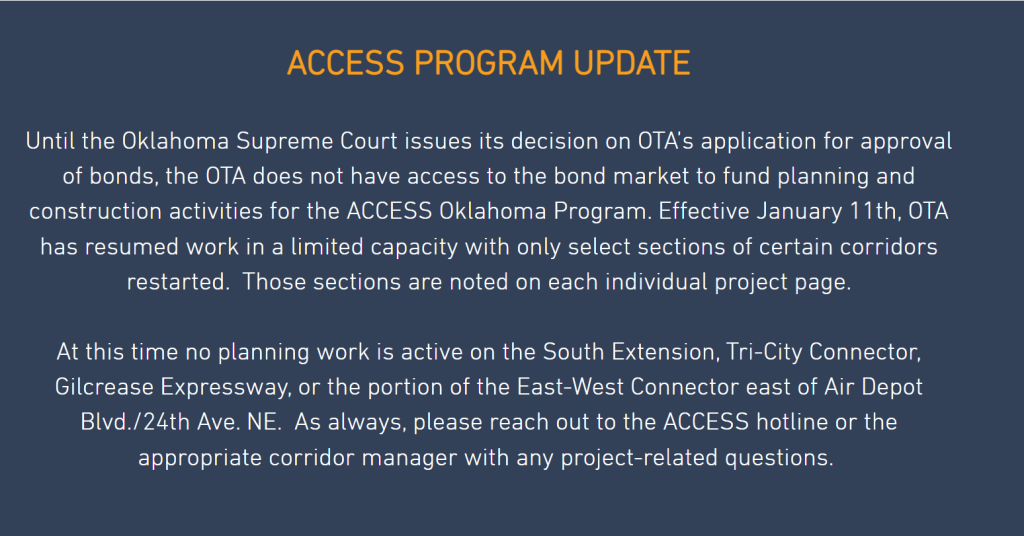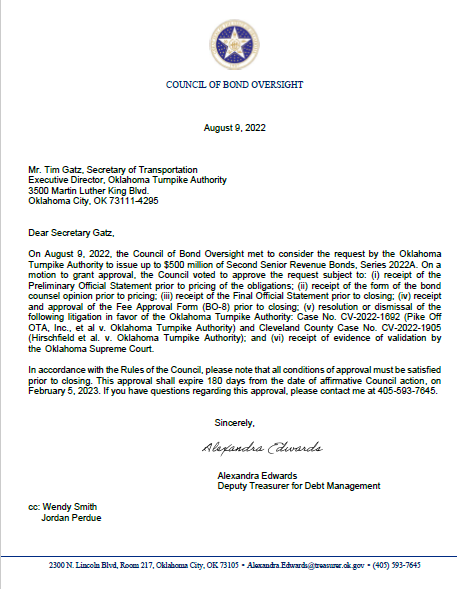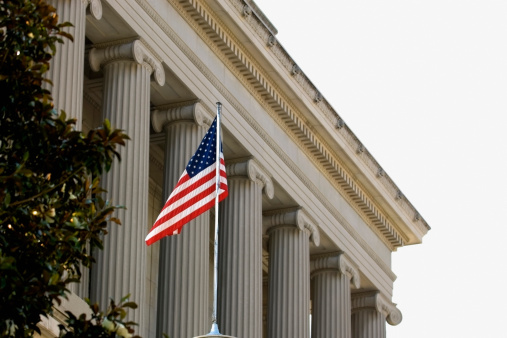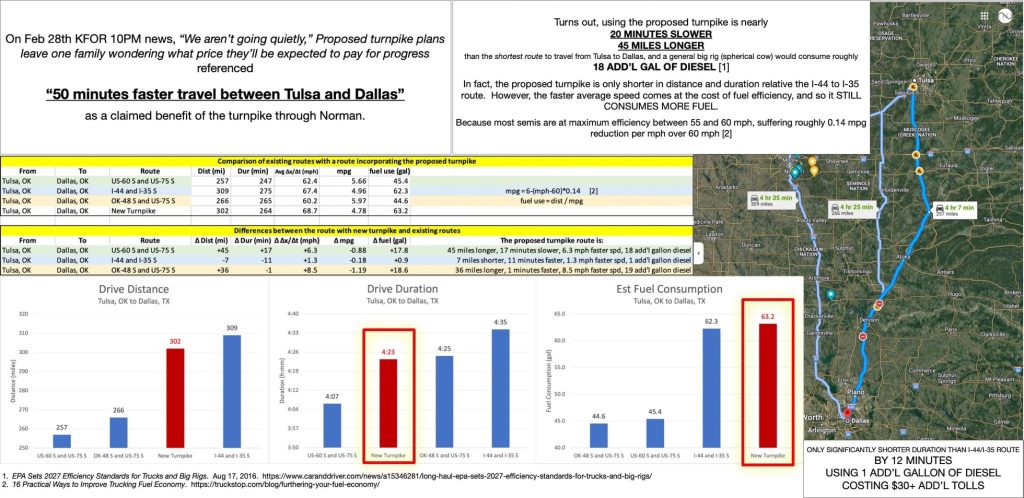
Where Does the OTA’s money come from?
Where does the OTA’s money come from?
From tolls? Yes. But also from bonds!
The large sums of money needed to fund new turnpike projects come primarily from bonds.
The Oklahoma Turnpike Authority (OTA) was counting on new bonds to fund the new ACCESS turnpike projects. Since August of 2022, OTA has been operating under conditional bond approval, but that approval expired on February 5.
Today on the OTA website is the following message:

What does the bond approval expiration mean?
The OTA’s website states “Until the Oklahoma Supreme Court issues its decision on OTA’s application for approval of bonds, the OTA does not have access to the bond market to fund planning and construction activities for the ACCESS Oklahoma Program.”
Why do I care?
Without access to bond money, the OTA pushed pause on much of the ACCESS turnpike project.
You may remember that on January 18 the US Bureau of Reclamation denied the OTA’s application to cross certain areas of land near Lake Thunderbird. In response the OTA issued a statement that they would be required to “modify the direction of the proposed alignment of the South Extension turnpike.”
Since then many people in the area have reached out with questions and concerns about the potential new route of the South Extension and possible resulting changes to the E/W Connector. However, since the OTA paused all such planning work, we anticipate that the current map will remain unchanged for now. This means more uncertainty and confusion for area residents.
The nitty gritty details
The OTA is required to get Council of Bond Oversight (COBO) approval for bond issues per the Oklahoma Bond Oversight and Reform Act, Title 62 Section 695.1-695.11(A). Section 695.3 defines the OTA as a state agency subject to that act. However, it is optional for the OTA to go to the Supreme Court as per Title 69, Section 1718. For example, the OTA did not go to the Supreme Court for approval of the bonds for the H.E. Bailey Norman Spur or the second leg of the Kilpatrick; historically, they have gone to the Supreme Court only when they see serious opposition to a project. The OTA went to the Supreme Court in 2016 for approval to build the Kickapoo. In those Supreme Court cases, they use Title 69, Section 1718 to head off any district court actions to stop their projects. [1]
In the case of ACCESS Oklahoma, the OTA submitted a request to COBO for permission to issue up to $500 million of Second Senior Revenue Bonds, Series 2022A. That request was heard at the August 9, 2022 COBO meeting. That same day, COBO sent a letter to the Secretary of Transportation, Tim Gatz, that laid out conditions on the Oklahoma Turnpike Authority (OTA)’s request.

The COBO voted to approve the OTA’s request subject to several conditions including:
- dismissal or resolution in the OTA’s favor of District Court Case No. CV-2002-1692 (Pike Off OTA, Inc., et al. v. OTA)
- dismissal or resolution in the OTA’s favor of Case No. CV-2022-1905 (Hirschfeld et al. v. OTA)
- evidence that the Oklahoma Supreme Court had granted the OTA’s application for the Supreme Court to validate, or approve, the $500 million in bonds
The COBO noted that all conditions of approval must be satisfied prior to closing, and that this conditional approval “shall” expire on February 5, 2023.
Per subsection (g) of 90:10-3-8 of the Administration Rules of the COBO, an extension may be granted at the discretion of the State Bond Advisor, a position now called the Deputy Treasurer for Debt Management. However, subsection (g) also requires that “a request for an extension must be made at least five (5) business days prior to the expiration of the original approval.” According to the Deputy Treasurer for Debt Management, no extension was requested by the OTA, so they they will have to file a new application with the COBO.
Now that the timeline on the conditional approval expired, with no request for an extension, the OTA may be waiting on resolution of the District Court Cases and Supreme Court decision before making a new request.
[1] Title 69, Section 1718, however, is unconstitutional to the extent it confers exclusive original jurisdiction on the Oklahoma Supreme Court for the subject matter of a bond validation case. In the late 1960s, the Oklahoma people passed an overhaul of Article VII of the Constitution, which governs the courts and the judiciary. The overhaul significantly expanded the jurisdiction of District Courts. It also removed the power of the legislature to take original jurisdiction away from District Courts in certain classes of cases, and give exclusive jurisdiction over to other courts, such as the Oklahoma Supreme Court. The overhaul also provided for the invalidity of any existing laws inconsistent with the new Constitutional provisions. The Oklahoma Supreme Court still maintains discretionary jurisdiction over classes of original jurisdiction cases that the legislature has given over to the Court. In October 2022, the Supreme Court assumed original jurisdiction of the OTA bond validation case, but also held that their assumption of jurisdiction did not extend to the matters pending before the district court, nor did it act as a stay of the matters pending before the district court (PR-120683).




